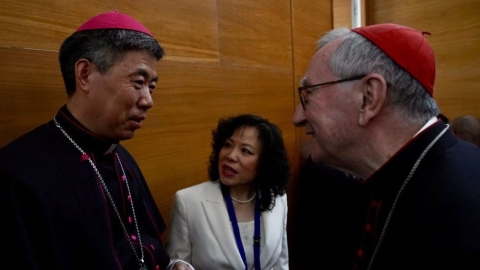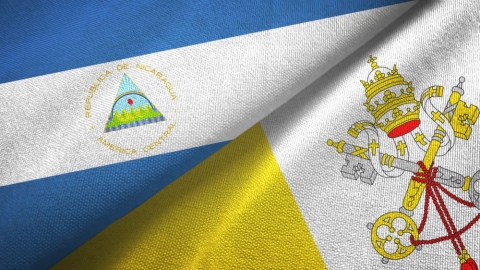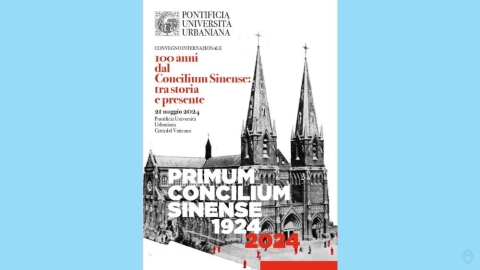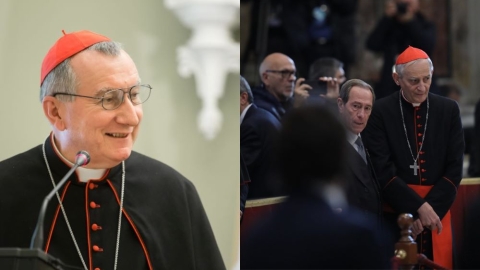Report and analysis of the Pope’s ecumenical journey to Sweden, October 31—November 1, 2016

The president of the Lutheran World Federation,
Munib Younan, and Pope Francis.
Report on the journey
On the occasion of the celebration of the fifth centenary of the Lutheran Reformation, Pope Francis traveled to Sweden on October 31, 2016, for a two-day trip during which he participated in two ecumenical events in the cities of Lund and Malmö (in the southern part of the country). During an interview granted on September 24 to the Swedish Jesuit Ulf Jonsson that was published in the journal La Civiltà Cattolica, the Pope explained that his role as “pastor” led him to change his itinerary by adding a day, November 1, to celebrate Mass at the request of the Swedish Catholics.
Francis was welcomed at the airport in Malmö by the Apostolic Nuncio Abp. Henryk Józef Nowacki, the Swedish Prime Minister Stefan Löfven and the Minister of Culture and Democracy Alice Bah-Kuhnke, and also by representatives of the World Lutheran Federation. The Supreme Pontiff was accompanied by Cardinal Pietro Parolin, Secretary of State of the Holy See, and by Cardinal Kurt Koch, President of the Pontifical Council for Promoting Christian Unity.
At 2:30 p.m., Pope Francis participated in an ecumenical prayer session in the Lutheran cathedral in Lund, where in the presence of 450 people he gave a homily on the unity of Christians. Quoting by way of introduction the words of Jesus at the Last Supper, “Abide in me: and I in you” (Jn 15:4), the Pope recalled that “we must be one with the Father if we wish to bear fruit.” He then tried to associate Lutherans in the “shared desire to remain one with Christ, so that we may have life,” thanking God that he could see “many brothers and sisters from different ecclesial communities who refused to be resigned to division.” “Our division,” Francis declared, “was perpetuated historically by the powerful of this world rather than the faithful people.” The Reformation was imposed by force in Sweden for political reasons, Fr. Ulf Jonsson declared in La Civiltà Cattolica, during his interview with the Pope. The Lutheran Reformation ensured that King Gustave Vasa had control over the Church and allowed him to dispose of its lands and revenues. Even today, the Jesuit explained, the Lutheran Church [in that country] is governed by a general synod, the members of which are elected by the political parties.
“With gratitude we acknowledge that the Reformation helped give greater centrality to Sacred Scripture in the Church’s life,” Francis continued. “Jesus intercedes for us as our mediator before the Father; He asks Him that His disciples may be one, ‘so that the world may believe’ (Jn 17:21),” he explained. “This is the testimony the world expects from us,” he reasoned. “We [Catholics and Lutherans] will be credible witnesses of mercy to the extent that forgiveness, renewal and reconciliation are daily experienced in our midst.... Without this service to the world and in the world, Christian faith is incomplete,” he declared.
At the end of the ceremony, a common declaration was signed, mentioning that “Many members of our communities yearn to receive the Eucharist at one table, as the concrete expression of full unity.... We pray to God that Catholics and Lutherans will be able to witness together to the Gospel of Jesus Christ, inviting humanity to hear and receive the good news of God’s redeeming action.” Catholics and Lutherans are committed to making progress in that direction.
At 4:40 p.m. the Pope arrived at the Arena Stadium in Malmö, 28 kilometers [17 miles] away, where he gave a speech and then met the various ecumenical delegations. He received a long ovation, flanked by Munib Younan and Pastor Martin Junge, the President and the Secretary respectively of the World Lutheran Federation, which was created in 1947 in Lund and now groups together 145 Protestant denominations, and also by Cardinal Kurt Koch. In his speech, given in the presence of almost 10,000 people, Pope Francis thanked God for this joint commemoration of the 500th anniversary of the Reformation, and stressed that the unity of Christians is a priority, because “what unites us is greater than what separates us.”
Francis Pope celebrating Mass in Malmö.
The next day, on November 1, the Holy Father celebrated Mass for the Solemnity of All Saints outdoors in Swedbank Stadium in Malmö, at the request of the Swedish Catholic faithful, before boarding the airplane to Rome. In fact, originally no public Mass had been foreseen for this apostolic journey, which was intended to be primarily ecumenical.
During his homily, given in the presence of 15,000 persons, including ecumenical delegations, Pope Francis meditated on holiness, which consists of “daily fidelity to the demands of our baptism”, emphasizing that “the Beatitudes are ... the Christian’s identity card,” in particular the beatitude “Blessed are the meek.” For “meekness conforms us to Jesus and unites us to one another; it enables us to set aside everything that divides us and set us against each other... so as to go forward on the path of unity” [with our separated brethren].
On the return flight, Pope Francis tried to distinguish his initiatives in the framework of the dialogue between Catholics and members of other religions from his “initiatives of reparation and asking forgiveness,” for instance from the charismatics of Caserta and the Waldensians of Turin, “because part of the Catholic Church did not act in a Christian way towards them. There it was necessary to ask for forgiveness and for wounds to be healed.”
Moreover the Pope made a distinction between refugees and immigrants “Migrating is a right, albeit a right which is highly regulated. On the other hand, being a refugee is the result of situations of war, suffering, hunger, terrible situations, and the refugee’s status calls for great attention, greater effort.” “In theory,” the Pope continued, “hearts must not be closed to refugees, but those who govern need prudence” depending on the country’s ability to integrate foreigners.
Five months before his visit to Sweden, on Sunday, June 5, 2016, Pope Francis had canonized the Swedish nun Marie Elisabeth Hesselblad (1870-1957), a Lutheran who converted to Catholicism in 1902. After entering the Carmelites in Rome in 1904, she took, with special permission from Pope Pius X, the habit of the Order founded by Saint Bridget of Sweden in 1363. Elisabeth Hesselblad reestablished the Order of Brigittines in Rome in 1911, then in Sweden in 1923. Beatified in April 200 by John Paul II, she was declared “Just Among the Nations” in 2004 for having saved Jews during World War II in Rome.
Analysis of the Pope’s statements by a Vaticanist
For the record, we recall the statement by Cardinal Gerhard Müller that DICI quoted two weeks ago (DICI no. 343 dated October 28, 2016). The Prefect of the Congregation for the Doctrine of the Faith declared in a book-length interview released in March 2016 by the Spanish publishing house BAC and entitled Informe sobre la esperanza (Report on Hope): “We Catholics have no reason to celebrate October 31, 1517, the date that marks the beginning of the Reformation that led to the division of Western Christianity.” He went on to explain: “If we are convinced that divine revelation has remained unchanged and been preserved through Scripture and Tradition, in the doctrine of the faith, in the sacraments, in the hierarchical constitution of the Church, founded on the sacrament of priestly ordination, we cannot accept the notion that there can be sufficient reasons to separate oneself from the Church.”
In plain language: if there are no “sufficient reasons to separate oneself from the Church”, it is necessary quite simply to return to it when one has had the misfortune of straying from it. Contrary to what Francis asserted in Sweden, this implies that the Protestant Reformation, to which the Council of Trent responded doctrinally, cannot be reduced to a struggle over political power; and that a common witness of faith cannot be given, in truth, by Catholics and Protestant who reject precisely this doctrine of faith (particularly about the Virgin Mary), the sacraments (including Holy Orders and the Eucharist) and the hierarchical constitution of the Catholic Church.
On November 3, 2016, the Vaticanist Sandro Magister analyzed on his website Chiesa this celebration by Pope Francis of the 500th anniversary of the Protestant Reformation. Here are the most significant excerpts from it:
Doctrine, sacraments, mission. These are the three critical points that Pope Francis addressed and resolved his own way, in celebrating together with the Lutherans, in Lund on October 31, the five hundredth anniversary of the Protestant Reformation.
Ecumenical prayer in the Lutheran cathedral in Lund.
Doctrine
In the area of doctrine, Francis calmly presented as a foregone conclusion the fact that “justification”, which was considered the biggest point of division between Catholics and Protestants, is completely outmoded.
Strictly speaking, however, when Catholics and Lutherans jointly signed an agreement on this subject in 1999, all the obstacles were not cleared away. The agreement did not deal with “the truths,” all of them, of the doctrine of justification, but only with “some truths” thereof, and partial ones at that....
Whereas now the joint Catholic-Lutheran statement that preceded the Pope’s journey to Lund went beyond that distinction, and hastily depicted the whole dispute as outmoded and shelved:
“The [1999] declaration nullified centuries-old disputes between Catholics and Lutherans over the basic truths of the doctrine of justification, which was at the center of the 16th-century Reformation.” ...
In the speech given in Lund, the Pope in fact reduced the doctrinal disagreements to linguistic misunderstandings, when he said that in essence the division stems from mere closed-mindedness “out of fear or prejudice toward the faith that believers of other confessions profess with a different accent and language.”
Sacraments
As for the sacraments, the crucial point of disagreement concerns the Eucharist, and in particular whether or not it is possible for Catholics and Protestants to receive communion together during the same ceremony.
One year ago, during a papal visit to the Lutheran church in Rome [on November 15, 2015], a Protestant woman married to a Catholic asked the Pope whether she could receive communion at Mass. (See DICI no. 325 dated November 20, 2015 ). Francis had replied with a rapid series of “yes, no, I don’t know, you decide,” which in any case gave everyone the impression that he had “opened the doors” to intercommunion....
[Certainly] in Lund, the solemn joint Lutheran-Catholic declaration did not take a single step forward on this specific point. Nevertheless it forcefully formulated a desire: “Many members of our communities yearn to receive the Eucharist at one and the same table, as the concrete expression of full unity. We experience the pain of those who share their whole lives, but cannot share God’s redeeming presence at the Eucharistic table. We acknowledge our joint pastoral responsibility to respond to the spiritual thirst and hunger of our people to be one in Christ. We long for this wound in the Body of Christ to be healed. This is the goal of our ecumenical endeavours, which we wish to advance, by renewing our commitment to theological dialogue also.”
This is the same desire that Francis had expressed very effectively in his seemingly incoherent but in reality coldly calculated reply at the Lutheran church in Rome.
Mission
Finally, in Lund, with regard to the evangelizing mission of the Church, Pope Francis had nothing to add to what he has already stated and restated dozens of times, most recently a few days before the journey, in an interview (granted on October 28, Editor’s note) with the Swedish Jesuit Ulf Jonsson for La Civiltà Cattolica: “We must keep one criterion very clearly in mind in any case: conducting proselytism in the ecclesial area is sin. Benedict XVI told us that the Church does not grow by proselytism, but by attraction. Proselytism is sinful behavior.”
Similarly, on October 13, while addressing a large group of Lutherans who had come on pilgrimage to Rome, Francis made the following statement: “Proselytism is the strongest venom that can attack the ecumenical process.”
And he had said the same thing, again this year, while addressing Orthodox Christians in Tbilisi, Georgia, on October 1: “There is a big sin against ecumenism: proselytism. We must never proselytize the Orthodox.”
And on February 12 in Cuba, in the joint statement that he made with Kirill, the Patriarch of Moscow: “The mission of preaching the Gospel of Jesus Christ in today’s world... includes mutual respect for the members of the Christian communities, and it excludes any form of proselytism.”
On this last occasion Francis had explained that by proselytism he meant “the use of unfair means to incite believers to pass from one Church to another, denying their religious freedom or their traditions.”
But Bergoglio has almost never been as careful in defining the meaning and scope of his condemnation of proselytism.
In most cases, this condemnation that he formulates is not limited to ruling out the conversion of Protestants and Orthodox to the Catholic faith, but seems to extend to the intention of making disciples and baptizing all peoples.
On August 7, 2013, the first time he lashed out as Pope against proselytism, he had declared in a video message addressed to Argentines on the occasion of the feast of Saint Cajetan, “Are you going to convince someone to become Catholic? No, no, no! Go to meet him, he is your brother. And that is enough.”
On October 1, during an interview with Eugenio Scalfari, founder of the newspaper La Repubblica and a leading representative of secularist thought, the Pope proved to be even more peremptory, if Scalfari’s transcription of his words is faithful: “Proselytism is a solemn foolishness; it makes no sense.”
And Sandro Magister recalls in conclusion:
The fact is that the decline of the missionary spirit continues to be one of the leading factors in the crisis confronting the Church today. And yet Pope Francis continues to lash out against its opposite; in other words, he fights against the presumed expansion of proselytism, although no sociological survey has turned up any trace of it.
And to check the effects this sinful “venom,” he insists that proclamation, evangelization, mission be reduced to a mute witness because basically—he declared—“we are all children of God,” even now, even people who are Muslims, Buddhists, Hindus, agnostics or atheists.
This is one of the most inexplicable contradictions of Francis’ pontificate. But it is also among the keys of his success (in the eyes of the world and of the media – Editor’s note). In Lund, too.
On November 2, Father Christian Bouchacourt, Superior of the District of France, issued a communiqué in French about this Joint Declaration of the Pope and the Lutherans, in which he declared:
How can we be “grateful for the spiritual and theological gifts received through the Reformation”, when Luther showed a diabolical hatred toward the Supreme Pontiff, a blasphemous disdain for the Holy Sacrifice of the Mass, as well as a refusal of the saving grace of Our Lord Jesus Christ? He also destroyed Eucharistic doctrine by rejecting transubstantiation, turned souls away from the Blessed Virgin Mary and denied the existence of Purgatory....
We invite the faithful of the District of France to pray and to do penance for the Supreme Pontiff so that Our Lord, whose Vicar he is, may preserve him from error and guard him in the truth of which he is the guardian.
(Sources: vatican/apic/imedia/LPL/chiesa – English translation by Matthew Sherry and Michael J. Miller – DICI no. 344 dated November 11, 2016)
Read also:
Sweden: The Pope will commemorate the 500th anniversary of the Protestant Reformation
Pope Francis visits Evangelical Lutheran church in Rome
Catholics and Lutherans together for the 500th Anniversary of the Lutheran Reform !
The Society of St. Pius X's study: From Ecumenism to Silent Apostasy (January 2004)





